#linda day george
Explore tagged Tumblr posts
Text


Allen Ludden and Richard Deacon unloading their cars at the Atlanta Celebrity Auction
7 notes
·
View notes
Text
A guest on Hollywood Squares called Vincent Price a 'terrifying pussycat' and he totally lost it.
'she called me a terrifying pussycat, now how can I pull myself together after that?'
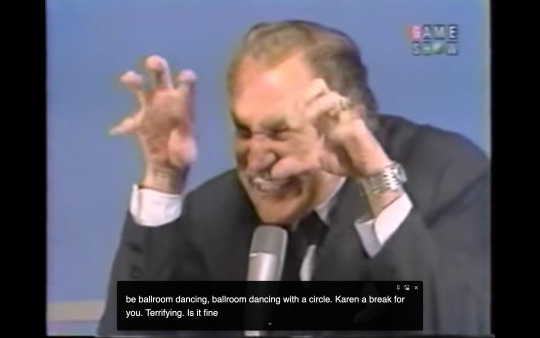
The Hollywood Squares
1972 - With Michael Landon, Lee Grant, Redd Foxx, Vincent Price, Wally Cox, Rose Marie, Mel Brooks, Linda Day George, and Paul Lynde.
#vincent price#hollywood squares#1972#rose marie#michael laondon#lee grant#redd foxx#wally cox#mel brooks#linda day george#paul lynde#dandy#i wish i knew how to make gifs cos that's a good one
39 notes
·
View notes
Text
2 notes
·
View notes
Text
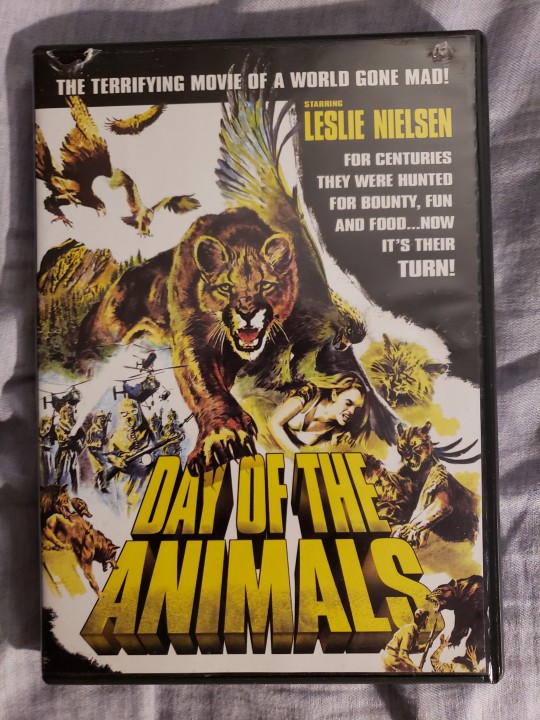
Now showing on my Spooktober Filmfest...Day Of The Animals (1977) on classic DVD 📀! #movie #movies #horror #DayOfTheAnimals #somethingisoutthere #christopherge #ripchristophergeorge #LeslieNielsen #ripleslienielsen #lindadaygeorge #michaelansara #SusanBacklinie #waltgorney #ripwaltgorney #richardjaeckel #riprichardjaeckel #bobbyporter #70s #dvd #spooktober #halloween #october
#movies#movie#horror#day of the animals#there's something out there#Christopher George#Richard Jaeckel#rip christopher george#rip richard jaeckel#linda day george#Michael Ansara#Leslie Nielsen#rip leslie nielsen#bobby porter#susan backlinie#walt gorney#rip walt gorney#70s#dvd#Spooktober#Halloween#october
6 notes
·
View notes
Text
Day of the Animals
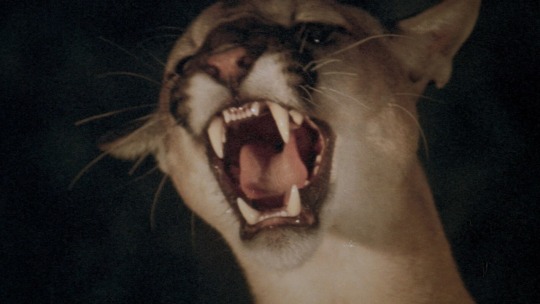
“Vultures and rattlers and bears, oh my!” could have been the tagline for William Girdler’s DAY OF THE ANIMALS (1977, Shudder) had anybody on the film been honest about how ridiculous it was. The depletion of the ozone layer creates a virus that affects animals and some humans (well, one that we see) in higher altitudes, which doesn’t bode well for Christopher George’s wilderness survival expedition. It doesn’t do much for the audience either unless you’ve got someone to laugh with you. Sadly, my dog and cat were not so inclined. It takes almost 30 minutes to get to the first animal attack, and many of them are laughably staged. Instead, we get a lot of forced drama as we meet the people foolish enough to book the expedition as some form of vacation fun. There’s a news anchor (Linda Day George) who wants to experience life rather than talk about it, an advertising executive (Leslie Nielsen) looking for people to treat rudely, a single mother (Ruth Roman) trying to bond with her 12-year-old son (played by a short 25-year-old stuntman with a gratingly high voice), a squabbling couple, a dying football player (Paul Mantee), a college professor (Richard Jaeckel) and two young innocents (Andrew Stevens and Susan Backlinie, the first victim in 1975’s JAWS) with no apparent motivation. Jaeckel and Christopher George (and the bear) had co-starred in the director’s previous film, GRIZZLY (1976), and Day came along to work with her husband. Their courtship scenes are among the film’s few saving graces, and it’s rather sad that not all their films together gave them the opportunity to demonstrate their easy rapport. The rest seem to be whoever needed to pay the rent on casting day. As the one human driven mad by ozone depletion, Nielsen fares the worst. He starts as a jerk and ends up an uneasy combination of Captain Ahab and Wolf Larsen. Lalo Schifrin did the score, and his attempts to build suspense by accompanying closeups of stalking animals with screeching strings and low piano notes get some of the film’s biggest laughs.
#eco horror#bad movies#william girdler#christopher george#linda day george#leslie nielsen#ruth roman#paul mantee#richard jaeckel#andrew stevens
1 note
·
View note
Text










1963 the beatles perform at the beatles christmas show, at the astoria cinema, finsbury park, london, new years eve, dec.31st
#They ate also george looks really pretty in a dress#Can we talk about how i really belive that paul was fighting for his life to not be the one put in the dress#its one of those days#I just really want to get paul mccartney pregnant sometimes you know? Like please i beg you let me hit#Ill treat you so much better than john lennon#paul mccartney#the beatles#john lennon#mclennon#george harrison#ringo starr#john and paul#beatlemania#rock music#60s rock#the beatles fandom#john and yoko#linda mccartney
742 notes
·
View notes
Text
Paul about the breakup of The Beatles in The Lyrics, 2021
The four of us just knew how to fall in with each other and play, and that was our real strength. That made it all the more sorrowful to think that our breaking up was almost inevitable. So there’s a wistful aspect to ‘Get Back’. The idea that you should get back to your roots, that The Beatles should get back to how we were in Liverpool. And the roots are embodied in the style of the song, which is straight-up rock and roll. Because that was definitely what I thought we should do when we broke up – that we should ‘get back to where we once belonged’ and become a little band again. We should just play and do the occasional little gig. The others laughed at that – quite understandably – because by then it was not really a practical solution. John had just met Yoko, and he clearly needed to escape to a new place, whereas I was saying we should escape to an old place. Reviving the old Beatles just wasn’t on the cards. It was too late to be recommending that we not forget who we were and where we once were from. If my dream at the time really was to get back to where we once belonged, John’s dream was to go beyond where we once belonged, to go somewhere we didn’t yet belong. I’ve already mentioned how in September 1969 we were in a meeting and talking about future plans, and John said, ‘Well, I’m not doing it. I’m leaving. Bye.’ In the ensuing moments, he was giggling and saying how this felt really thrilling, like telling someone you’re going to divorce them and then laughing. At the time, obviously, that was wildly hurtful. Talk about a knockout blow. You’re lying on the canvas, and he’s giggling and telling you how good it feels to have just knocked you out. It took a while, but I suppose I eventually got with the programme. This was my best mate from my youth, the collaborator with whom I’d done some of the best work of the twentieth century (he said, modestly). If he fell in love with this woman, what did that have to do with me? Not only did I have to let him do it, but I had to admire him for doing it. That was the position I eventually reached. There was nothing else I could do but be cool with it.
(Paul McCartney about Get Back (1969), The Lyrics, 2021)
That was coupled with the business problems at Apple Records, which really were horrible. The business meetings were just soul-destroying. We’d sit around in an office, and it was a place you just didn’t want to be, with people you didn’t want to be with. There’s a great picture that Linda took of Allen Klein, in which he’s got a hammer like Maxwell’s silver hammer. It’s very symbolic. And that’s why we have the little nod and a wink in the middle section to ‘You Never Give Me Your Money’, in the lines ‘I never give you my pillow / I only send you my invitations’. That whole period weighed on me to such an extent that I even began to think it was all tied in with the idea of original sin. Even though my mum had christened me as a Catholic, we weren’t brought up Catholic, so I didn’t buy into the concept of original sin on a day-to-day basis. It’s really very depressing to think that you were born a loser.
(Paul McCartney about Carry That Weight (1969), The Lyrics, 2021)
The Beatles stuff all got too heavy, and 'heavy' at that time had a very particular meaning for me. It meant more than oppressive. It meant having to go into meetings and sit in the boardroom with all the other Beatles and with the accountants and with this guy Allen Klein. He was a New York spiv who had come over to London and talked to The Rolling Stones and persuaded them he was the man for them. Prior to that, he had persuaded Sam Cooke he was the man for him. I smelled a rat but the other chaps didn’t, so we had a fight over it and I got voted down. I was trying to be Mr Rational and Mr Sensible, and it all went haywire. It was early 1969, and The Beatles were already beginning to break up. John had said he was leaving, and Allen Klein told us not to tell anyone, as he was in the middle of doing deals with Capitol Records. So, for a few months we had to keep mum. We were living a lie, knowing that John had left the group. Allen Klein and Dick James, who sold our publishing in Northern Songs without giving us a chance to buy the company, were both hanging around in the background of this song. All the people who had screwed us or were still trying to screw us. It’s fascinating how directly we acknowledged this in the song. We’d cottoned on to them, and they must have cottoned on to the fact that we’d cottoned on. We couldn’t have been more direct about it. ...
Contracts were written on funny paper. Lying behind the song is the idea of the contract as a relationship between two people. The negotiations are at once business negotiations and romantic negotiations; I’m thinking of the lines ‘And in the middle of negotiations / You break down’. The breakdown in negotiations is also a kind of nervous breakdown. The problem was that, by this stage, everything was up for negotiation, and miscommunication was the order of the day. We weren’t really writing together anymore. Each person was bringing in little bits of this and little bits of that. And we all knew that phase of our lives, of being The Beatles, was coming to an end. We were working towards an album, knowing it was probably going to be our final fling. Though Let It Be was released later, Abbey Road was indeed the last album we recorded in the studio. There was an upside, however. I’d got married to Linda, and our relationship offered some respite from the dreary infighting and the financial stuff. The lines ‘One sweet dream / Pick up the bags and get in the limousine’ were a reference to how Linda and I were still able to disappear for a weekend in the country. That saved me.
(Paul McCartney about You Never Give Me Your Money (1969), The Lyrics, 2021)
This was just after The Beatles broke up, and I was trying to establish myself as a solo artist with a new repertoire. If it was going to work like the Beatles repertoire had worked, I had to have a hit. One in two songs had to be a hit. So, this was a conscious effort to write a hit, and Phil was very helpful. We knew that if we had a hit, it would cement our relationship and we would keep working together, which we did with the RAM album. It would prove that we were both good – he as a producer and I as a singer songwriter. Releasing my first solo song after the breakup felt like a big moment. Thrilling, though tinged with sadness. It also felt like I had something to prove, and that kind of challenge is always exciting. The song went to number two in the UK singles chart and number five in the US Billboard Hot 100, so it did pretty well. Of course, this was still a time when there was a bit of tension between John and me, and this sometimes filtered into our songwriting. John made fun of this song in one of his own, ‘How Do You Sleep?’The only thing you done was yesterday And since you’ve gone you’re just another day One of his little piss takes.
(Paul McCartney about Another Day (1969/1971), The Lyrics, 2021)
This song was written a year or so after The Beatles breakup, at a time when John was firing missiles at me with his songs, and one or two of them were quite cruel. I don’t know what he hoped to gain, other than punching me in the face. The whole thing really annoyed me. I decided to turn my missiles on him too, but I’m not really that kind of a writer, so it was quite veiled. It was the 1970s equivalent of what we might today call a ‘diss track’. Songs like this, where you’re calling someone out on their behaviour, are quite commonplace now, but back then it was a fairly new ‘genre’. The idea of too many people ‘preaching practices’ was definitely aimed at John telling everyone what they ought to do – telling me, for instance, that I ought to go into business with Allen Klein. I just got fed up with being told what to do, so I wrote this song. ‘You took your lucky break and broke it in two’ was me saying basically, ‘You’ve made this break, so good luck with it.’ But it was pretty mild. I didn’t really come out with any savagery, and it’s actually a fairly upbeat song; it doesn’t really sound that vitriolic. If you didn’t know the story, I don’t know that you’d be able to guess at the anger behind its writing. It was all a bit weird and a bit nasty, and I was basically saying, ‘Let’s be sensible. We had a lot going for us in The Beatles, and what actually split us up is the business stuff, and that’s pretty pathetic really, so let’s try and be peaceful. Let’s maybe give peace a chance.’ The first verse and the chorus have pretty much all the anger I could muster, and when I did the vocal on the second line, ‘Too many reaching for a piece of cake’, I remember singing it as ‘Piss off cake’, which you can hear if you really listen to it. Again, I was getting back at John, but my heart wasn’t really in it. This is me saying, ‘Too many people are sharing the party line. Too many people are grabbing for a slice of the cake, a piece of the pie.’ The ‘sleep in late’ thing – whether that was accurate, whether John and Yoko actually slept in late or not, I’m not sure (although John often was a late riser when I would drive out to Weybridge so that we could write together). They were all references to people thinking that their own truth was the only truth, which was certainly what was coming from John. The thing is, so much of what they held to be truth was crap. War is over? Well no, it isn’t. But I get what you’re saying: war is over if you want it to be. So, if enough people want war to be over, it’ll be over. I’m not sure that’s entirely true, but it’s a great sentiment; it’s a nice thing to think and to say.
I’d been able to accept Yoko in the studio, sitting on a blanket in front of my amp. I’d worked hard to come to terms with that. But then when we broke up and everyone was now flailing around, John turned nasty. I don’t really understand why. Maybe because we grew up in Liverpool, where it was always good to get in the first punch of a fight. The whole story in a nutshell is that we were having a meeting in 1969, and John showed up and said he’d met this guy Allen Klein, who had promised Yoko an exhibition in Syracuse, and then matter-of-factly John told us he was leaving the band. That’s basically how it happened. It was three to one because the other two went with John, so it was looking like Allen Klein was going to own our entire Beatles empire. I was not too keen on that idea. John actually had Allen Klein and Yoko in the room, suggesting lyrics during writing sessions. In his song ‘How Do You Sleep?’ the line ‘The only thing you done was yesterday’ was apparently Allen Klein’s suggestion, and John said, ‘Hey, great. Put that in.’ I can see the laughs they had doing it, and I had to work very hard not to take it too seriously, but at the back of my mind I was thinking, ‘Wait a minute, All I ever did was “Yesterday”? I suppose that’s a funny pun, but all I ever did was “Yesterday”, “Let It Be”, “The Long and Winding Road”, “Eleanor Rigby”, “Lady Madonna”, . . . – fuck you, John.’ I had to fight them for my bit of The Beatles and, in fact, for their bit of The Beatles, which many years later they realised and almost thanked me for. Nowadays people get it, but at the time I think the others felt they were the ones who were victims, who were being hurt by my actions. Allen Klein already had a history with The Rolling Stones. I just thought, ‘Oy oy oy, no, this guy’s got such a bad reputation.’ And good old John says, ‘Oh, if he’s that badly talked about, he can’t be all bad.’ John had this kind of distorted thinking, which was amusing sometimes. But not when someone was going to take everything that John and George and Ringo and I owned and had worked really hard to get.
So, I stood up as the sensible one and said, ‘This is not good.’ Klein wanted twenty per cent, and I said, ‘Tell him he can have ten, if you have to go with him.’ ‘Oh no, no, no,’ they came back. ‘No, he wants twenty.’ It seemed to me they were just fucking out of it and making no attempt to do anything sensible. A lot of hurt went down during that period in the early 1970s – them feeling hurt, me feeling hurt – but John being John, he was the one who would write a hurtful song. That was his bag.
(Paul McCartney about Too Many People (1971), The Lyrics, 2021)
Towards the end of 1969, John had quite gleefully told us it was over. There were a few of us in the Apple boardroom at the time. I think George was away visiting family, but Ringo and I were at the meeting, and John was saying no to every suggestion. I thought we should go back to playing smaller gigs again, but the answer came back: ‘No’. Eventually John said, ‘Oh, I’ve been wanting to tell you this, but I’m leaving The Beatles.’ We were all shocked. Relations had been strained, but we sat there saying, ‘What? Why? Why? Why?’ It was like a divorce, and he had just had a divorce from Cynthia the year before. I can remember him saying, ‘Oh, this is quite exciting.’ That was very John, and I had admired this kind of contrarian behaviour about him since we were kids, when I first met him.
He really was a bit loony, in the nicest possible way. But whilst all of us could see what he meant, it was not quite so exciting for those left on the other side.
(Paul McCartney about Dear Friend (1971), The Lyrics, 2021)
This is one of my favourite songs. It's a ballad with a brass section, but it’s always felt Victorian in style to me. It’s very heartfelt. ‘A love so warm and beautiful / Stands when time itself is falling’. I like that idea, instead of just saying, ‘It will go on forever.’ I got a good feeling writing this song, and listening to it now, I still do. ‘Love, faith and hope are beautiful’. The brass solo is lovely for me because it harks back to the brass bands that were so common when I was a kid; there would often be brass bands in the park or in the streets. My dad played trumpet, as I never fail to mention, and he had his own little band – Jim Mac’s Jazz Band. The first instrument he bought me was a trumpet, and he taught me the scale of C which, when you go on the piano, becomes B-flat. It’s all very complicated. That’s why we didn’t even bother learning music. I realised that I wanted to swap the trumpet for a guitar, so I asked his permission, and he said, ‘Yes, okay.’ ‘Warm and Beautiful’ was written well after the demise of The Beatles, and at this time we knew sadness. I knew about delving into your mind to look for help and looking for some sort of solace in a song. I liked the idea of writing a song in a universal way that dispels the sadness. You write about the wonderful things you know in the world, and you try to write so that it will sing well and be well received by people dealing with grief something that inevitably surrounds all of us at one time or another. On a more personal level, the main inspiration for the song was Linda…
(Paul McCartney about Warm and Beautiful (1976), The Lyrics, 2021)
After The Beatles thing became so depressing, Linda and I decided we’d get out of London and start living full-time on our small holding in Scotland. It was quite a difficult period because of the band’s breakup but it allowed me to see another side of myself. First and foremost, we did everything for ourselves, and at this point it was Linda, Heather, Mary – who was still a baby – and me. If we needed something to eat, we’d go into town in the little Land Rover, come back up, and cook it. We didn’t have anyone helping us, except for one guy, the shepherd, because it was a little sheep farm. It was an experience that allowed me to be a man. <…> I’d grown up in Liverpool and gone on the road with The Beatles around the world and then around again, and now here I was on a farm in the middle of nowhere, and it was sensational. <…> This was the kind of thing I’d never done, ever, in my life, and it was amazingly liberating. I got to do all the things I think a lot of young people still dream about today – the famous ‘gap year’. I sense a lot of people want that freedom, escaping the rat race…
(Paul McCartney about When Winter Comes (1992), The Lyrics, 2021)
After the breakup of The Beatles, I wouldoften just sit around a lot. Sometimes I sat in the kitchen while the kids were playing. Maybe they were drawing. Maybe they were doing bits and pieces of homework. In this case, I came across the chords and I just felt optimistic, and I liked the idea of a song saying that help is coming and there’s a bright light on the horizon. I’ve got absolutely no evidence for this, but I like to believe it. It helps to lift my spirits, to move me forward, and hopefully it might help other people move forward too.
(Paul McCartney about Great Day (1972/1997), The Lyrics, 2021)
Wings, which we began in 1971, was in many ways an experiment to see whether there was life after The Beatles, to see whether that success could be followed. It was the result of asking myself, ‘Am I going to stop now?’ The Beatles were so wonderful and all-encompassing, so successful. Now, should I stop and look for something else to do? But I thought, ‘No. I like music too much, so whatever the something else is, it will be music.’ <…> But it wouldn’t be The Wings, like The Beatles. Just Wings. My problem after The Beatles was, who’s going to be as good as them? I thought, ‘We can’t be as good as The Beatles, but we can be something else.’ I knew that if I were to go ahead with this project I’d have to tough it out, but I had reserves of courage from being part of The Beatles when pennies were thrown at us at the village hall in Stroud, when we were still starting out. <…> Starting off a new band is always a lot of fun, but it’s a lot of hard work too; you have to establish yourself. Following The Beatles was one of the most difficult things for me, just trying to live up to those expectations. It was even more difficult for her [Linda]. I started to write songs for Wings from 1971 onwards, when we got started, and I tried to keep them away from The Beatles’ style. There were avenues I could go down that I wouldn’t have gone down with The Beatles, like bringing in the influence of reggae, which Linda and I got into in Jamaica. I fancied doing something crazy, and Wings allowed me a little bit more freedom. So, this is a love song in which Cupid’s arrow is referenced, but it’s a malevolent arrow. It’s possible I’d seen an illustration of Cupid and thought, ‘Cupid fires a bow, but I’ll switch it. It won’t be love; it will be the opposite.’ The character in the song has been wounded. He’s been cheated on. And it could’ve been a great relationship, could’ve been fantastic. As things stand, you couldn’t ‘have found a more down hero’, because there was nobody more down than me at that moment. So, get it together and bring your love. I have always had a soft spot for this song. There’s a nice horn riff in it, and it’s funky. Sometimes you write to get a sort of feeling rather than a perfectly ‘correct’ lyric. Sometimes the lyric can be secondary to the feeling. This one has as much, or more, to do with the feel of the song, the groove.
(Paul McCartney about Arrow Through Me (1979), The Lyrics, 2021)
John described ‘Coming Up’ somewhere as ‘a good piece of work’. He’d been lying around not doing much, and it sort of shocked him out of inertia. So it was nice to hear that it had struck a chord with him. At first, after the breakup of The Beatles, we had no contact, but there were various things we needed to talk about. Our relationship was a bit fraught sometimes because we were discussing business, and we would sometimes insult each other on the phone. But gradually we got past that, and if I was in New York I would ring up and say, ‘Do you fancy a cup of tea?’
(Paul McCartney about Coming Up (1979), The Lyrics, 2021)
It’s very possible that I’d been feeling down in London. I was back in the solace of family and Liverpool, and what with the Beatles troubles down south, I was likely thinking, ‘Wouldn’t it be nice to get home and have that comfortable feeling again?’ So, there may have been some of that in the background. I wouldn’t rule it out. When I wrote the song, I hadn’t been back home to Liverpool for a long time. But now I was at my dad’s house, which wasn’t quite home because it was a house I’d bought him when I got some money – a five-bedroomed mock Tudor place in Heswall near the River Dee. But it was still Liverpool, and it was ‘homeward’. So I added, ‘Once there was a way to get back homeward / Once there was a way to get back home’. The song turned out to be quite soulful, and I think that’s what attracted me to those lyrics in the first place – that notion of consoling a baby or reading kids a bedtime story. ‘Sleep, pretty darling, do not cry / And I will sing a lullaby’. Those are lines – or something with a similar sentiment – that most parents probably say to their children to soothe them when they’re growing up.
(Paul McCartney about Golden Slumbers (1969), The Lyrics, 2021)
It became a refuge of sorts, and it was nice to get away from London and everything – both the good and bad – that comes with the city. I would drive a Massey Ferguson 315 tractor and mow the hay, and I loved that because I’d been a nature fiend as a kid, and this freedom just gave me time to think – ‘Down to Junior's Farm where I want to lay low’. It was such a relief to get out of those business meetings with people in suits, who were so serious all the time, and to go off to Scotland and be able just to sit around in a T-shirt and corduroys. I was very much in that mindset when I wrote this song. The basic message is, let’s get out of here. You might say it’s my post-Beatles getting-out-of-town song.
(Paul McCartney about Junior's Farm (1974), The Lyrics, 2021)
The context in which the song was written was one of stress. It was a difficult time because we were heading towards the breakup of The Beatles. It was a period of change partly because John and Yoko had got together, and that had an effect on the dynamics of the group. Yoko was literally in the middle of the recording session, and that was challenging. But it was also something we had to deal with. Unless there was a really serious problem – unless one of us said, ‘I can’t sing with her there’ – we just had to let it be. We weren’t very confrontational, so we just bottled it up and got on with it. We were northern lads, and that was part of our culture. Grin and bear it. One interesting thing about ‘Let It Be’ that I was reminded of only recently is that, while I was studying English literature at the Liverpool Institute High School for Boys with my favourite teacher, Alan Durband, I read Hamlet. In those days you had to learn speeches by heart because you had to be able to carry them into the exam and quote them. There are a couple of lines from late in the play: O, I could tell you But let it be. – Horatio, I am dead I suspect those lines had subconsciously planted themselves in my memory. When I was writing ‘Let It Be’, I’d been doing too much of everything, was run ragged, and this was all taking its toll. The band, me we were all going through times of trouble, as the song goes, and there didn’t seem to be any way out of the mess. <…> Around the time we recorded ‘Let It Be’, I’d been pushing the band to go back out and play some club dates – to get back to basics and just bond again as a band, end the decade like we’d begun it, just playing for the love of it. We didn’t get to do that as The Beatles, but that idea did inform the direction of the Let It Be album. We didn’t want any studio trickery. It was supposed to be an honest, no-overdubbing album. It didn’t exactly end up that way, but that had been the plan.
(Paul McCartney about Let It Be (1969), The Lyrics, 2021)
This song is also an analogy for when something goes wrong out of the blue, as I was beginning to find happening around this time in our business dealings. Recording sessions were always good because no matter what our personal troubles were, no matter what was happening on the business front, the minute we sat down to make a song we were in good shape. Right until the end there was always a great joy in working together in the studio. So there we were, recording a song like ‘Maxwell’s Silver Hammer’ and knowing we would never have the opportunity to perform it. That possibility was over. It had been knocked on the head like one of Maxwell’s victims. Bang bang.
(Paul McCartney about Maxwell's Silver Hammer (1969), The Lyrics, 2021)
In much the way that Linda wanted to flee from New York society– the constrictions of Park Avenue and Scarsdale – I wanted to flee from what The Beatles had become. I was hoping to escape, she was hoping to escape. So we had this feeling that we had each pulled the other ‘out of time’. Though the song was written immediately after The Beatles’ breakup, it was somehow included under the Lennon-McCartney rubric, where it doesn’t belong. It was one of my first solo songs, but because of the deal, it got caught in the publishing net. That was very annoying. <…> …the central idea being that there’s so often a split between the inner and outer. <…> The elements of fear and loneliness are very much to the fore. ‘Maybe I’m afraid of the way I love you’ is itself a troubling idea. While it’s true that Linda is the person I’m addressing, it’s also true that I’m dealing in fiction. Starting with myself, the characters who appear in my songs are imagined. <…> In any event, this song isn’t the conventional way of presenting a relationship, or of some of the contradictions that can arise from being in love. <…> It shows the fragility of love.
(Paul McCartney about Maybe I’m Amazed (1970), The Lyrics, 2021)
John went to the exhibition, and I think that was when he and Yoko met, towards the end of 1966. He climbed up a ladder to see what she’d written on the ceiling, and got close enough to it to read it, and it said, ‘Yes.’ So he thought, ‘That’s a sign; this is it,’ and they fell madly in love. Once they were an item, there was the whole Beatles recording thing, where she would be there too. I think this started at the beginning of the ‘White Album’ sessions – so, around the end of spring in 1968. And at first we all – all of us except John – found it pretty intrusive, but we went along with it and worked around her. And eventually I came to the realisation that, look, if John loves her, we’ve just got to let it be, and we’ve got to support this relationship. That was basically my feeling. Then, a year or two later, The Beatles broke up, and it was a bad period, a real low point, where everyone was taking potshots at everyone. And I felt that John and Yoko were particularly good in the potshot department, saying things in interviews, or comments that would make their way to you. They would say not always very pleasant things, and looking back on it, I sort of think, ‘Why? You’re annoyed, so say something unpleasant?’ Over time, the situation eased off and my relationship with John got better, and I used to see him in New York or speak to him on the phone.
(Paul McCartney about Golden Earth Girl (1993), The Lyrics, 2021)
I’m not sure I thought of it at the time, even though this was well after The Beatles disbanded, but I can’t help connecting the oppressiveness associated with that phrase to the oppressiveness that coincided with the end of The Beatles. Not that The Beatles are over exactly. It’s not like we were some little band that never had another record; even though half of us have died, the phenomenon continues stronger than ever. Everything I do seems to be painted with ‘Beatle’…
(Paul McCartney about Put It There (1988), The Lyrics, 2021)
Add to this
#sorry for the long quotes but I like if they's extensive#I like to see context#john lennon#paul mccartney#george harrison#ringo starr#interview: paul#you never give me your money#too many people#get back#dear friend#when winter comes#warm and beautiful#carry that weight#coming up#golden earth girl#golden slumbers#great day#accidental divorce#john and paul#paul and linda#paul and yoko#let it be#maxwell's silver hammer#maybe I’m amazed#put it there#the songs we were singing#paul and klein#allen klein#john and klein
232 notes
·
View notes
Text



Ringo Starr and Barbara Bach at their wedding April 27, 1981. The ceremony took place place at the Marylebone Registry Ottice and Guests included George and Olivia. Harrison, Paul and Linda McCartney (holding his son James) and Bach's son Gianni🌹🌼💐
📸Terry O'Neill🌼
Via @mccartneysteam on Instagram💐
#60s icons#girlsofthesixties#the beatles wives#george harrison#olivia harrison#george and olivia#paul mccartney#linda mccartney#paul and linda#ringo starr#barbara bach#ringo and barbara#wedding day#1981
112 notes
·
View notes
Text
Get Back Rewatch 55 Years On: Day 22
@javelinbk I’ve got another one for your “Paul McCartney doesn’t touch other men” compilation.
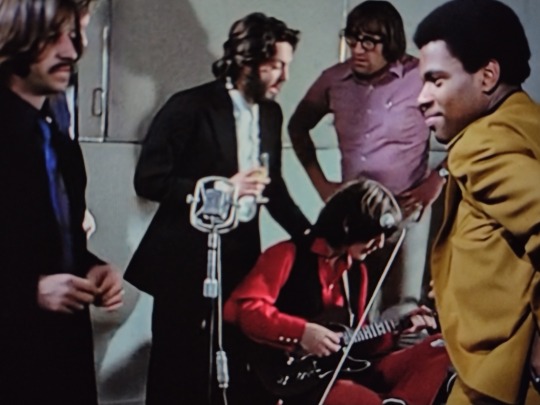
They’re really just going to keep goofing off with each other until the bitter end, aren’t they?
Who is this?? She’s gorgeous and I’m obsessed with her eye makeup.

I wonder if there’s a *reason* John broke randomly into “Run for your Life”. I’d actually feel better about that song if it was secretly about Paul, though I'd never considered it.
That face!
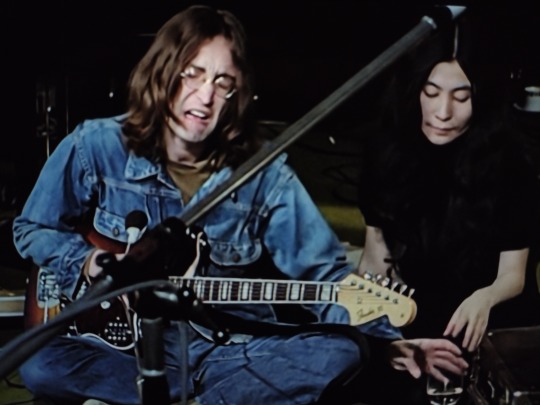
I’d actually love to know what Ringo and Billy were talking about that prompted that hug, though! I’m sure it must’ve been just so cute!

John saying “Okay Jim” to Paul. Reminds me of that quarrymen story where John called Paul that. Such an awkward nick-name, considering John hated Jim. Like I know Paul’s first name is James and all, but it’s just weird. I wonder if he called him that often and why and how Paul felt about it.
It’s physically impossible for two people to actually love each other that much and break up. I just. It’s not real. I can’t process it.
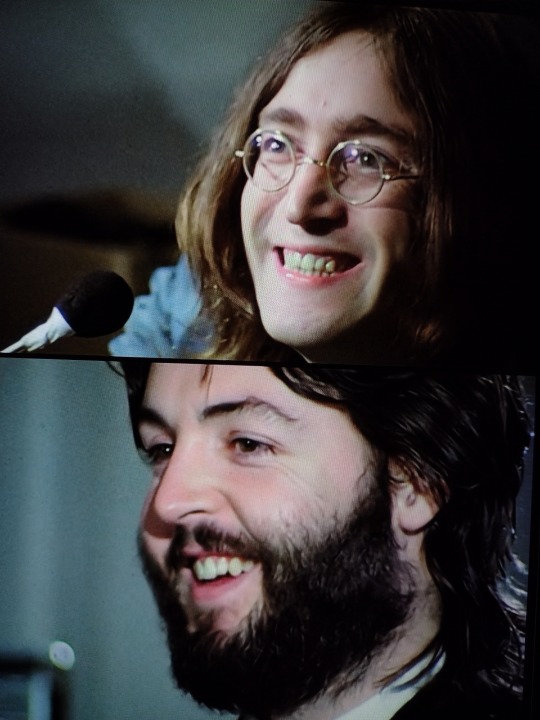
The fact that Paul wore a suit again, though, and plays standing. An example of Paul doing what makes him feel good whether it’s cool or not. He feels professional and put together in a suit and standing for the “performance” of these softer songs, so that’s what he’s going to do. I guess Ringo’s in a suit too, and tie. I just didn’t catch it at first because his tie and shirt are such a fun purple.
John focused on Paul for the entire song of “Two of Us” and Paul very purposely avoiding eye-contact. It’s like a much less painful, but still awful, reverse version of the strawberry fields moment.
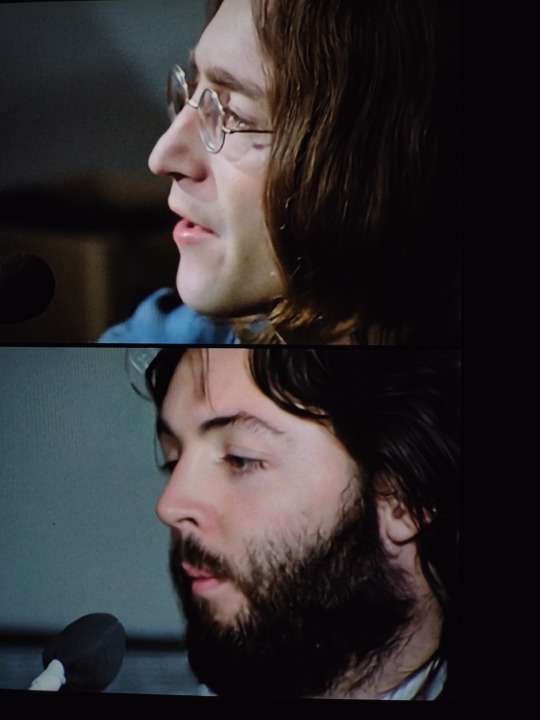
The silly fake German. Paul’s “Ein Schwein, fille naught rhine.” Reminds me of John’s “Un. Du. Ein schwein hickle pickle” in front of “I Don’t Wanna Face It” which also used a very similar riff to “coming up”. IDK they’re just always talking. Always logging away every little eyelash flutter. Every meaningless thing means something with John and Paul. I know. I realize I’m fully certifiable.
“Are we supposed to giggle in the solo?” “Yeah.”
Paul’s just purposely ruined what’s probably like the five-hundredth take of Let it Be with his drunk uncle voice, and this is George. No matter how much he might want to stay annoyed at them, he never can.
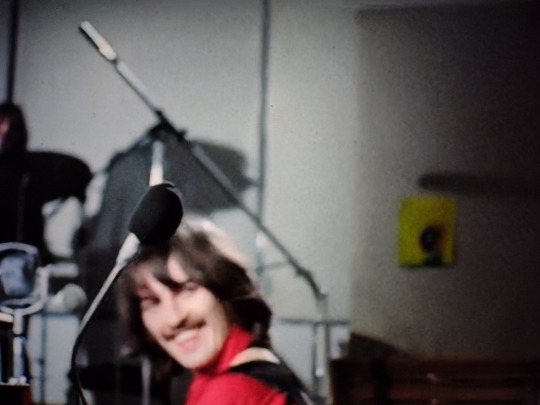
I wonder when exactly John goes from “I think that was rather grand. I’d take one home with me.” on Let it Be to, “Yeah, he was just trying to write another bridge over troubled water. Could’ve been Wings.” When exactly did the meaning (dead mom says not to fight for your relationships) sink in that made him hate the song?
I love that we end on Paul saying, “we’ll do one more.” I love that there’s never a tied-up, clean-cut ending for the Beatles. There’s always a “Her Majesty” tacked on after “The End” to leave room to continue on.
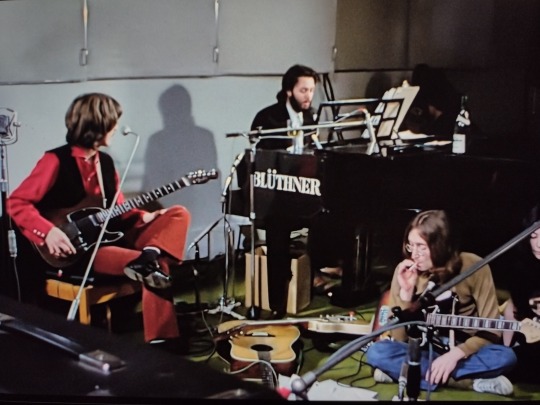
#get back#paul mccartney#the beatles#john lennon#mclennon#ringo starr#george harrison#Thanks again everyone for all the support on these :)#40 days from now Paul and Linda get married#48 days until John and Yoko have their turn#232 days until John tells Paul he wants a divorce#434 days until Paul announces that they're over
167 notes
·
View notes
Text





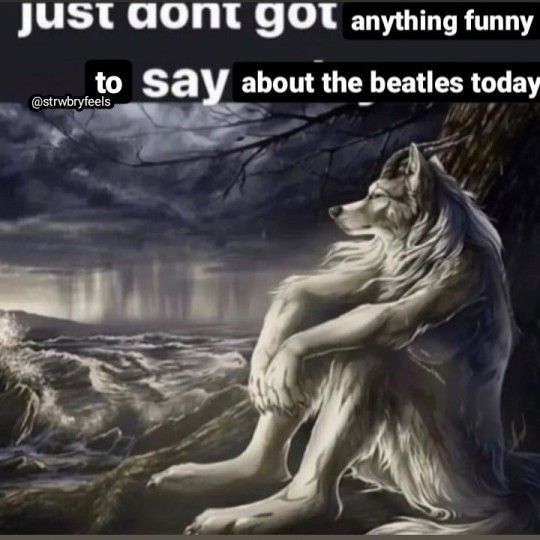




#the beatles memes#beatles memes#mclennon#bug boy brainrot#paul mccartney#john lennon#george harrison#ringo starr#linda mccartney#magical mystery tour#sgt peppers lonely hearts club band#1960s#1970s#my old memes#rubber soul#a hard day's night#the beatles#john and paul#uncle albert#ram album
38 notes
·
View notes
Text

'Dogma' by James Goodridge.
#Art Of The Day#Art#AOTD#James Goodridge#Dogma#Kevin Smith#Matt DAmon#Ben Affleck#Salma Hayek#Chris Rock#Linda Fiorentino#Alan Rickman#Alanis Morissette#Jason Mewes#George Carlin#Jason Lee
34 notes
·
View notes
Text
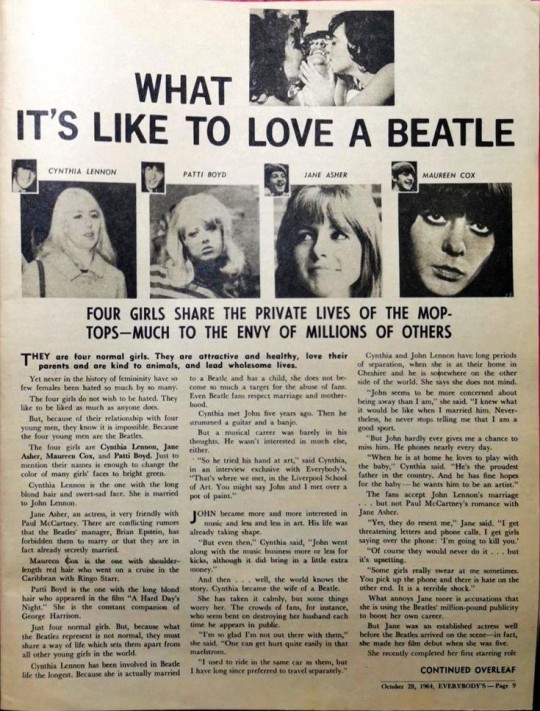
#the beatles#john lennon#paul mccartney#ringo starr#george harrison#cynthia lennon#pattie boyd#maureen starkey#jane asher#linda mccartney#yoko ono#a hard day's night#help!#please please please#abbey road#with the beatles#sgt peppers lonely hearts club band
100 notes
·
View notes
Text

Happy Beatles Day!!!
#the beatles#paul mccartney#george harrison#ringo starr#john lennon#linda mccartney#abbey road#happy beatles day
154 notes
·
View notes
Text
#fanfiction#the beatles#fanfic#beatles fan#ringo starr#george harrison#john lennon#paul mccartney#heather mccartney#linda mccartney#george and ringo#john and paul#ringo and Paul#old age#101 years old#memories#album#pictures#old days#ao3 link#ao3 writer#ao3 fanfiction#ao3 beatles#Starrison
2 notes
·
View notes
Text




-McBeardy-
Today is the birthday of Sir Paul McCartney who I couldn’t live without, so here is something I finished a little while ago.
McCartney circa 1970 with his ‘Get Back’ beard.
I think it just about works.
Strangely enough I think I see his daughter Mary in his eyes, so I think that’s a win.
And a very happy Father’s Day to all you dads out there!
Made in Super Sculpey.
For more, check out my Instagram!
#sculpture#traditional#polymer clay#super sculpey#headsculpt#fimo#likeness#caricature#TheBeatles#Paul McCartney#Ringo Starr#George Harrison#John Lennon#Paul McCartney and Wings#Band on the Run#Linda McCartney#Stella McCartney#Mary McCartney#Happy Fathers Day#Fathers’s Day#artists on tumblr#sculptors on tumblr
5 notes
·
View notes
Text

On January 16 1980, Paul McCartney and the Wings arrived In Tokyo for upcoming 11-dates Wings tour in Japan. Customs Officials found 219 grams (7.7 ounces) of cannabis in Paul’s luggage and arrested him.
Paul was sent to the local jail and spent 9 days there while the Japanese government decided on what to do with him. He was facing a possible seven-year sentence for smuggling if convicted.
"When the fellow pulled it out of the suitcase, he looked more embarrassed than me. I think he just wanted to put it back in and forget the whole thing, you know, but there it was. I didn’t try to hide it. I had just come from America and still had the American attitude that marijuana isn’t that bad. I didn’t realize just how strict the Japanese attitude is. I made a confession on the night I was arrested and apologized for breaking Japanese law, but they still wanted to know everything. I had to go through my whole life story—school, father’s name, income, even my medal from the Queen." Paul McCartney
While in jail, Paul was known as inmate #22 and impressed the guards with his politeness. He passed the time with exercising, talking to other prisoners and overall, Paul said he was treated well. On the sixth day, Linda was allowed to visit, giving him clothes and new books.
"It’s really very silly. People certainly are different over here. They take it so very seriously. Paul is now in some kind of detention place and I have not been allowed to see him. As soon as they get someone nice like Paul, they seem to make a field day of it! I’ll never come back to Japan again. It’s my first trip and my last!" Linda McCartney
On the eighth day, the Japanese government decided to immediately deport Paul without charges. On January 25th, Paul was released from the jail, placed in a car and was driven straight to the airport when Linda, his children and fellow Wings members were waiting for him and flew back to England.
George Harrison was the only Beatle to send a telegram to the McCartneys during the nine days:
Thinking of you with all love. Keep your spirits high. Nice to have you back home again soon. God bless. Love, George and Olivia.
According to a housekeeper of the Lennon's, John's supposed reaction was, "If he really needs weed, surely there's enough people who can carry it for him. You're a Beatle, boy, a Beatle. Your face is in every damn corner of the planet. How could you have been so stupid."
Years later, Paul has acknowledged the foolish of his decision and the challenges he faced during that period. Paul did return to Japan in 1990 for a tour without incident.
543 notes
·
View notes